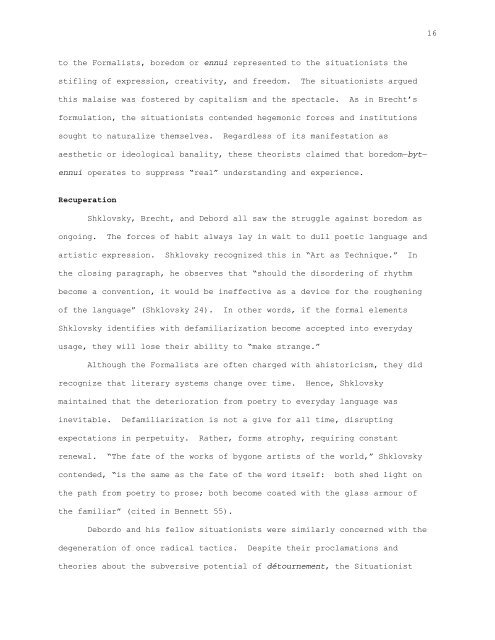Defamiliarization - Audrey Watters
Defamiliarization - Audrey Watters
Defamiliarization - Audrey Watters
You also want an ePaper? Increase the reach of your titles
YUMPU automatically turns print PDFs into web optimized ePapers that Google loves.
to the Formalists, boredom or ennui represented to the situationists the<br />
stifling of expression, creativity, and freedom. The situationists argued<br />
this malaise was fostered by capitalism and the spectacle. As in Brecht’s<br />
formulation, the situationists contended hegemonic forces and institutions<br />
sought to naturalize themselves. Regardless of its manifestation as<br />
aesthetic or ideological banality, these theorists claimed that boredom—byt—<br />
ennui operates to suppress “real” understanding and experience.<br />
Recuperation<br />
Shklovsky, Brecht, and Debord all saw the struggle against boredom as<br />
ongoing. The forces of habit always lay in wait to dull poetic language and<br />
artistic expression. Shklovsky recognized this in “Art as Technique.” In<br />
the closing paragraph, he observes that “should the disordering of rhythm<br />
become a convention, it would be ineffective as a device for the roughening<br />
of the language” (Shklovsky 24). In other words, if the formal elements<br />
Shklovsky identifies with defamiliarization become accepted into everyday<br />
usage, they will lose their ability to “make strange.”<br />
Although the Formalists are often charged with ahistoricism, they did<br />
recognize that literary systems change over time. Hence, Shklovsky<br />
maintained that the deterioration from poetry to everyday language was<br />
inevitable. <strong>Defamiliarization</strong> is not a give for all time, disrupting<br />
expectations in perpetuity. Rather, forms atrophy, requiring constant<br />
renewal. “The fate of the works of bygone artists of the world,” Shklovsky<br />
contended, “is the same as the fate of the word itself: both shed light on<br />
the path from poetry to prose; both become coated with the glass armour of<br />
the familiar” (cited in Bennett 55).<br />
Debordo and his fellow situationists were similarly concerned with the<br />
degeneration of once radical tactics. Despite their proclamations and<br />
theories about the subversive potential of détournement, the Situationist<br />
16


